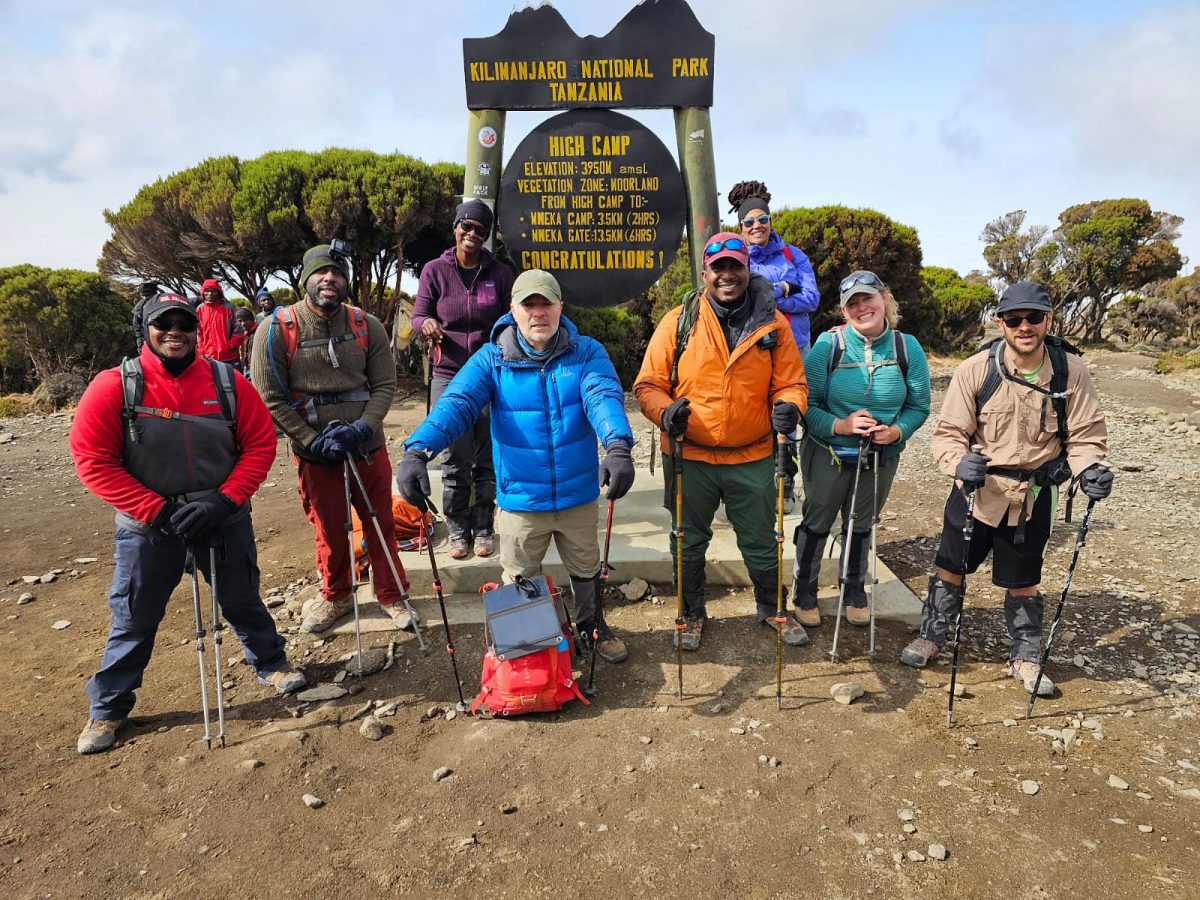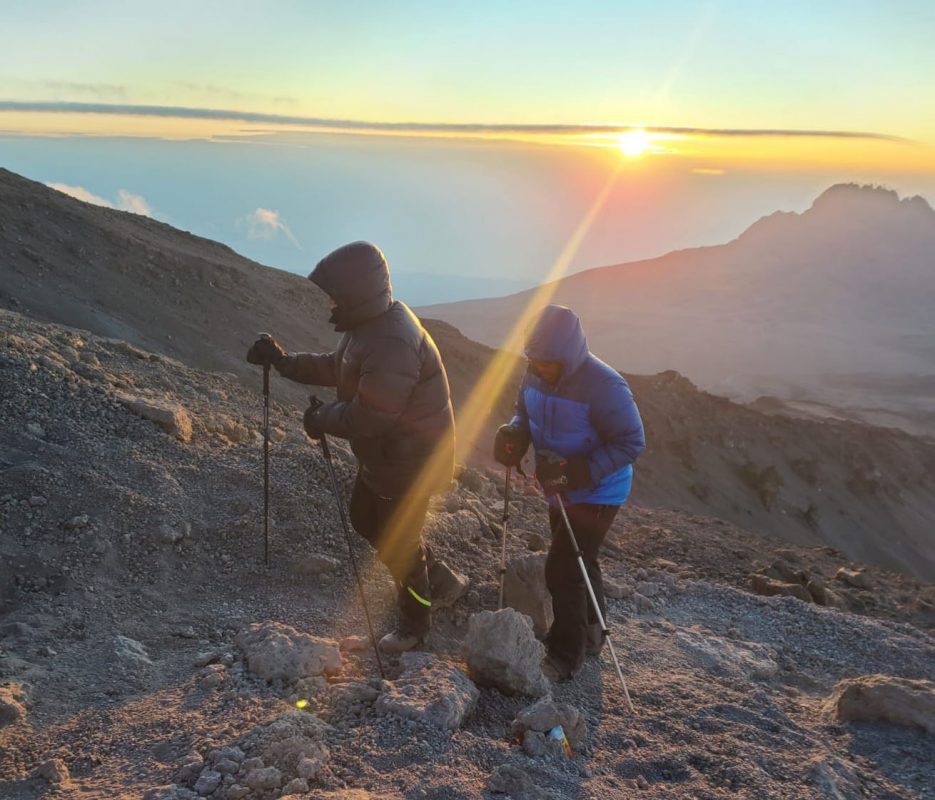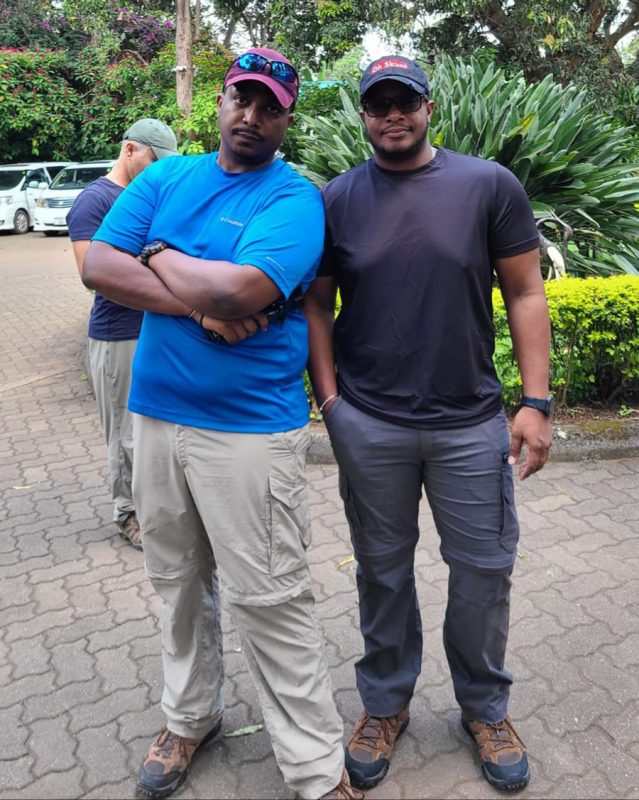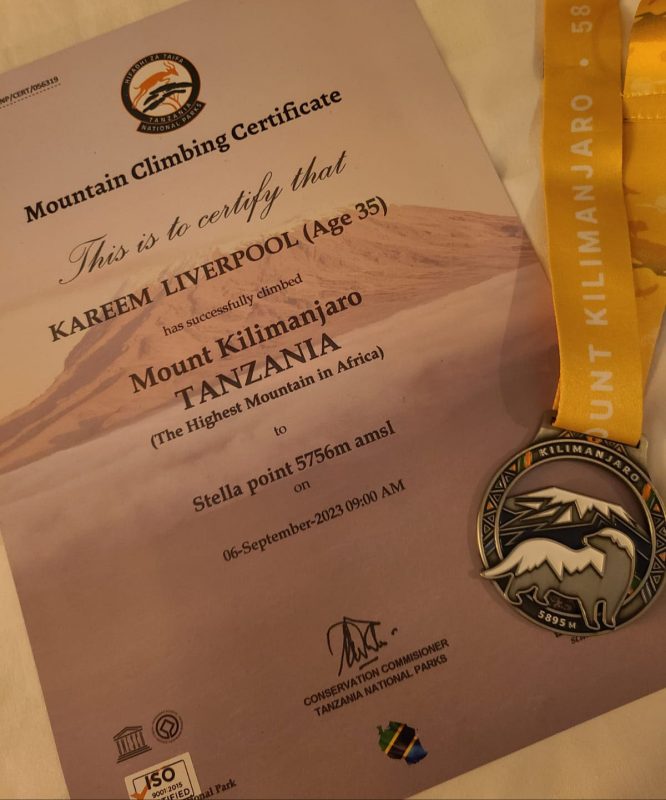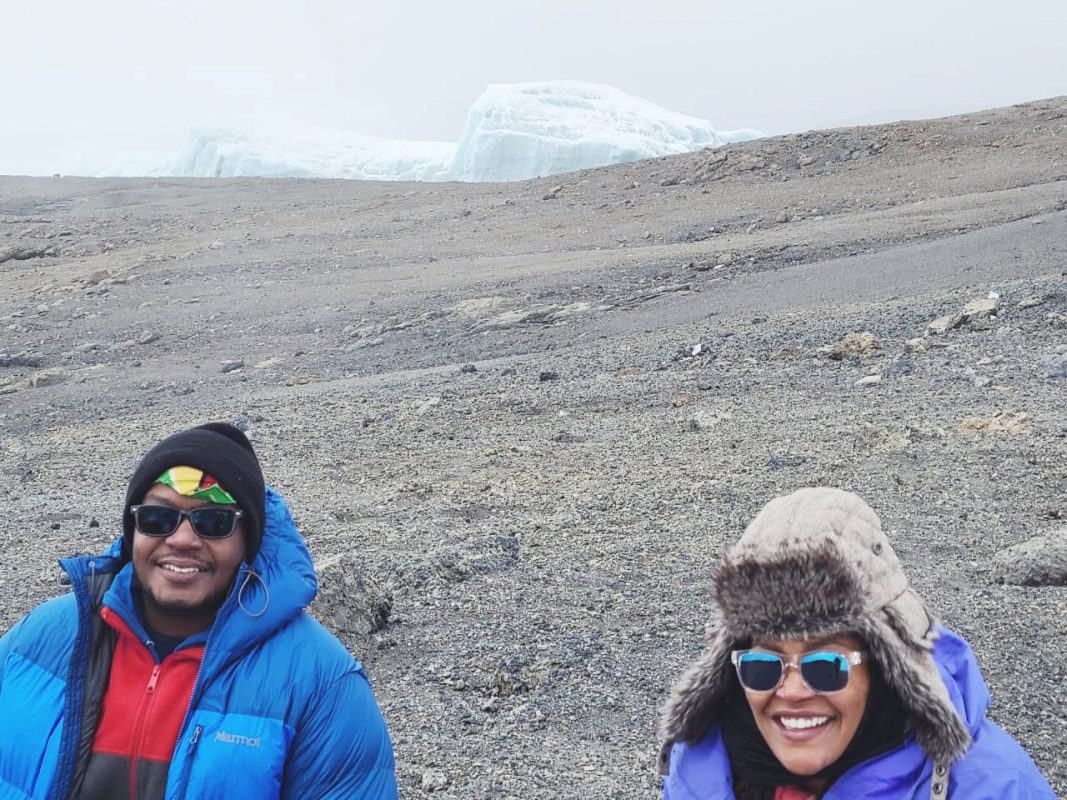By Miranda La Rose
When Jemel Liverpool invited his brother, Kareem to take part in a seven-day safari to summit Mount Kilimanjaro, Africa’s highest free-standing and dormant volcanic mountain, with a group of close friends to celebrate his 40th birthday, he gladly accepted and began mental and physical preparations in earnest. This was over two years ago.
On 6th September, 2023 Kareem, 35, made it to Stellar Point, one of three official summits of Mt Kilimanjaro, but unfortunately due to low oxygen blood levels Jemel did not. The other two are Gilman’s Point and Uhuru Peak, the main summit.
It was a memorable trip and one of the best experiences Kareem would not want to repeat in his lifetime.
“On the night before summiting I was thinking, ‘Oh man, why are we doing this?’ As those thoughts came in, I quickly pushed them aside. There was no turning back with just one more climb to the top of the mountain. It reminded me of how important mindset is when the going gets more tough. It was a life lesson in itself, to keep on going despite adversities knowing the end result that awaits,” Kareem, a past Marian Academy student, told Stabroek Weekend.
The group of nine that included Kareem assembled in Maryland, USA then travelled to Kilimanjaro Airport, Moshi, Tanzania, arriving on August 31. It comprised Jemel and his wife Monique Cooper-Liverpool of the USA, Monique’s friend Kim Jefferson, the Liverpools’ cousin Frank Denbow of Jamaica, the Liverpools’ family friend and Roman Catholic priest Fr Carl Philadelphia of Guyana, and Jemel’s friends David Campobenedetto of the USA, Wassim Charifi from Lebanon and Jesse Bennet. Charifi and Bennet live in Liberia. Seven of the nine completed the climb to the summit.
“The event was a coming of age and a personal spiritual growth for Jemel. It was for everyone invited to find their own perspective or take-away from it,” Kareem said.
The only advice Kareem got from his father, Lt Colonel (ret’d) Fairbairn Liverpool, who has had extensive training in the military was, ‘Enjoy every moment of it.’
Their goal was to reach Stellar Point with sunrise on the morning of September 6, Jemel’s birthday. Six days of climbing were advised.
The night before they set out, their tour guides checked their bags, clothing and protective gear to ensure they could deal with the terrain, changing weather and climatic conditions and everything that came with the climb. The tour group, Altezza Travel provided a 40-man team that included cooks, porters and tour guides.
As they left the hotel for Kilimanjaro National Park on 1st September to begin the climb they were excited. “The mood was one of nervous energy, anxiety mixed with excitement. We were optimistic about what lay ahead knowing there were going to be challenges,” Kareem related.
After lunch in the national park, they started out at 2,100 metres above sea level.
“It was a cold morning. That first day we did about 10 kilometres of climbing in about four to five hours. Something we heard very often on the trip was ‘pole, pole’ in Swahili meaning ‘slowly, slowly. Don’t rush. Take it easy’.”
Everyone was still in good spirits when they got to Shira 1 Camp, their first stop on the 70 kilometres climb to the summit along the Lemosho route, one of several to either of the three summits.
“We slept at different camps on the way to the summit. So our bodies had time to rest, recover and acclimatise.
“It was my first experience sleeping in that altitude and in cold air. Once we got into the tents and into our sleeping bags, it wasn’t too bad. Diamox helped with adjusting to the altitude but one of the side effects was frequent urination and having to get out in the cold air in the night,” Kareem said. “A lot of us did not sleep that night. The first two to three nights I didn’t sleep well because of the excitement and adrenaline. For the first two to three nights I was running on a total of about ten hours of sleep.”
Every morning and before every climb, the guides who are trained in first aid, checked the vitals of everyone to ensure they were capable of climbing and dealing with the high altitude.
From Shira 1 they hiked to Shira 2 Camp on day two for about another five hours through a steep rocky and sandy elevation. “It was windy from the start. We were lucky we had a lot of sun and no rain. But we dealt with a lot of dust kicked up by boots along the trail that affected a lot of people. We wore ski masks/balaclavas and that helped with the wind chill. Wind chill was one of one of our biggest opponents on the entire hike.”
At Shira 2 Camp, Jemel and Karim acknowledged they were already at a higher elevation than Mount Roraima, which is 9,220 feet (2,810 m); Shira 2 Camp stands at 15,190 ft (4,630 m).
On day three, the climb to the third campsite was about ten hours in changing terrain. “That was one of the most gruelling days on the climb. At one point we were climbing on rocks then descending to find areas in which to climb back higher. It tested our cardio and put a lot of strain on the legs and the knees.”
Sunrises, sunsets and nights with no obstructions to the sky above were beautiful to witness Kareem said.
“The higher we got we began moving through clouds that blocked out the sun. The clouds came with colder temperatures. Being in the clouds was like being in a fog. Once the sun was out it was strong.”
Challenging
From day three into day four, Jemel and Frank began to experience the high altitude effect.
During day three, Jemel experienced nausea and vomiting. “He questioned whether he would make it to the next camp. He was given oxygen and soup to re-energise. That was our first major challenge with someone suffering the effects of the altitude,” Kareem recalled.
The three women in the group, Kareem said, did well. “Kim was an inspiration. She stayed close to the main guide keeping pace with him and she kept the group going. We played music as background to the climb. Monique is Liberian and she played a lot of African music including Afrobeats. So Burna Boy and Destra soca queen also kept us company. There was not much talking because we were conserving energy.”
On day four, they did a lot of rock climbing and crossed the steep Barranco Wall.
“We did no rope climbing. However, we had to stretch and hold on to find footing. There is a part of the wall called the Kissing Rock. The space to step around the rock is small so you have to hug the rock and a lot of people kiss it while going around hence the name. That part was scary. You don’t look down. You look up and keep moving. Any misstep could lead to serious injury,” Kareem noted.
They prayed every day. However, passing the Barranco Wall to get to Barranco Camp, Kareem said, “Fr Carl did Stations of the Cross, just to keep us going.”
Jemel continued to be challenged, so they took turns walking slower with him to encourage him to keep going. He had frequent rests as they moved higher and higher.
By day five the group was at about 13,000 ft where the air was thinner.
“We didn’t have to worry about animals, only the altitude. It was difficult to breathe while climbing. Exhaustion started to kick in by the time we got to base camp below the summit. That was one of our shorter days. We climbed for about four or five hours that day for about seven kilometres. We had lunch about two or three o’clock in the afternoon and rested before climbing the summit that night,” he related.
At about 9.30 pm, the group packed their dinner and other necessities for the summit in freezing temperatures. “That was scary. We made sure we had our water. The interesting part of day five into day six was that the higher we got, the water in our packs began to freeze. Five hours into the climb that night on day five into day six the water was frozen. We stored water upside-down in our packs as the water froze from the top. We started climbing about 11 pm with only our head lamps for lighting. We weren’t seeing where we were going or how high we were. We just followed the guides. Sunrise was about 6.30 am and we were still climbing when we started to see around us. It was such a beautiful sight and being up above the clouds. The sunrise at that elevation was absolutely beautiful.”
At the top of the mountain are two glaciers. The water in the streams formed from these glaciers were what the tour group used along the way. They saw the glaciers that are left on the mountain. With global warming, it is said they will disappear in a few years’ time.
“I felt blessed to see them. That is the reality of global warming and the effects it is having around the world,” Kareem said.
On arrival at the summit, they prayed as they had done every step of the climb. Kareem took out his Guyana flag and so did his colleagues who walked with the Jamaican, Liberian and American flags; they displayed them.
“I experienced a deep feeling of gratitude to my brother for making it possible for me to achieve this once in a lifetime experience. On the entire trip I had a small Guyana flag on my head and if it wasn’t on my head, it was attached to my bag. I was repping Guyana all the time.
The cold wind at the summit was brutal, Kareem said. “I couldn’t wear my ski mask to cover my nose because it made it harder for me to breathe and it fogged up my glasses. I had to remove that and face the cold wind. I’m asthmatic. Luckily I had no issues with that. I felt the effects as it bruised my nose and my lips were cracked.”
They were at the summit for about half an hour when the weather started to change. The clouds came in with sleet and it became colder so they started their descent back to the base camp.
“Those six days of climbing were pretty much wrapped up in half an hour but it was worth it.”
The sand and small rock-terrain descent took a toll on Kareem’s knees. They came down a different and faster route than they had used going up.
“That was challenging for a lot of people. We were going down faster and getting winded easier. We had to slide to navigate the sand and the rocks. I was in a lot of pain from that three-hour descent to base camp. It was very difficult for everyone. Two porters helped David down from the summit as his legs could not deal with the steep descent. We were thankful that no one fell.”
Day six into day seven the group that made it to the summit covered some 18 kilometres going upward and downward. “We were very sore all over.”
It was advised that each member do cardiovascular training in preparation for the climb and Kareem had worked out at Spartan Gym with local trainer Ewin Enmore in Georgetown. “Without his training, I definitely would not have been able to make it. I worked out at least three to four times each week over the past year. That helped me to get into good enough shape,” he said.
At base camp, they ate then rested for about an hour and a half before descending to a lower altitude camp at about 3,800 m to spend the night. At base camp they were warned not to sleep for fear of the heart rate dropping too low.
On day seven they left the camp and walked another 15 kilometres of muddy, rocky terrain and vegetation to get back to where they would meet the vehicle taking them back to the hotel.
Celebrations
Back at the hotel, “We laughed and said it is one of the best experiences of our lives that we would not want to do again. We have it down as one of the hardest things we have ever done. Monique and Kim said they preferred childbirth than climbing that mountain again,” Kareem told Stabroek Weekend.
Unfortunately, Jemel and Father Carl did not make it to the summit. Jemel started the summit climb but over an hour into the climb his oxygen levels had dropped too low and he returned to the base camp where he was given oxygen. Father Carl was sick and he did not attempt it.
“For my brother, the experience for him was rewarding. The guides reassured him that many people don’t make it to the base camp below the summit. We were all happy that everyone was fairly healthy and in a good state of mind at the end of the trip. We were able to experience it and to complete where many people turn back after day two.”
On day eight they took an early morning flight to Zanzibar in the Indian Ocean where they were welcomed with the Kilimanjaro Song, which is sung to those who successfully make the climb to the summit.
“We danced with them. That was like Mashramani for us. Celebration after hard work. I was fortunate the altitude did not affect my appetite. Some lost theirs. I ate everything on the trip. Then the food in Zanzibar was so good I ate everything, especially the fresh seafood,” Kareem said.
